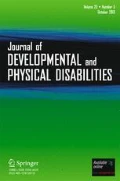Abstract
Parents of children with a developmental disability completed a survey that sampled self-reported needs (information, support, giving explanations to others, community services, finances, and family functioning) in relation to situational variables, such as age (child and parents), type of educational service received by the child, number of siblings, marital status of parents, family income, parents' level of education, and the family's participation in support services. Families of younger children were found to have the greatest overall needs. Increased number of hours per week of employment by fathers was associated with reduced needs. There also was less reported need by families who had a child enrolled in a residential-care setting. These findings extend the assessment of family needs to a population and age of children not addressed in previous research. Recommendations for the types of professional services that should be offered to families on the basis of an assessment of need are presented and discussed.
Similar content being viewed by others
REFERENCES
Albanese, A. L., San Miguel, S. K., and Koegel, R. L. (1996). Social support for families. In Koegel, R. L., and Koegel, L. K. (eds.), Teaching Children With Autism: Strategies for Initiating Positive Interactions and Improving Learning Opportunities, Paul H. Brookes, Baltimore, MD, pp. 95–104.
Bailey, D. B., and Blasco, P.M. (1990). Parents' perspectives on a written survey of family needs. J. Early Intervention 14: 196–203.
Bailey, D. B., Blasco, P. M., and Simeonsson, R. J. (1992). Needs expressed by mothers and fathers of young children with disabilities. Am. J. Ment. Retard. 97: 1–10.
Bailey, D. B., and Simeonsson, R. J. (1988). Assessing needs of families with handicapped infants. J. Spec. Educ. 22: 117–127.
Baker, B. L. (1989). Parent Training and Developmental Disabilities, American Association on Mental Retardation, Washington, DC.
Bristol, M. M., and Schopler, E. (1984). A developmental perspective on stress and coping in families of autistic children. In Blacher, J. (ed.), Severely Handicapped Young Children and Their Families, Academic Press, Orlando, FL, pp. 91–141.
DeMeyer, M. K. (1979). Parents and Children With Autism, Wiley, New York.
Dunst, C. J., and Trivette, C. M. (1990). Assessment of social support in early intervention programs. In Meisels, S. J., and Shonkoff, J. P. (eds.), Handbook of Early Childhood Intervention, Cambridge University Press, New York, pp. 326–349.
Koegel, R. L., Schreibman, L., Loos, L. M., Dirlich-Wilhelm, H., Dunlap, G., Robbins, F., and Plienis, A. J. (1992). Consistent stress profiles in mothers of children with autism. J.Autism Dev. Disord. 22: 205–216.
Moes, D. (1996). Parent education and parenting stress. In Koegel, R. L., and Koegel, L. K. (eds.), Teaching Children With Autism: Strategies for Initiating Positive Interactions and Improving Learning Opportunities, Paul H. Brookes, Baltimore, MD, pp. 79–93.
Moes, D., Koegel, R. L., Schreibman, L., and Loos, L.M. (1992). Stress profiles for mothers and fathers of children with autism. Psychol. Rep. 71: 1272–1274.
Plienis, A. J., Robbins, F. R., and Dunlap, G. (1988). Parent adjustment and family stress as factors in behavioral parent training for young autistic children. J. Multihandicapped Person 1: 31–52.
Singer, G. H. S., Irvine, A. B., and Irvin, L. K. (1989). Expanding the focus of behavioral parent training: A contextual approach. In Singer, G. H. S., and Irvin, L. K. (eds.), Support for Cargiving Families: EnablingPositive Adaptation to Disability, Paul H. Brookes, Baltimore, MD, pp. 85–102.
Wolf, L. C., Noh, S., Fisman, S. N., and Speechley, M. (1989). Brief report: Psychological effects of parenting stress on parents of autistic children. J. Autism Dev. Disord. 19: 157–166.
Author information
Authors and Affiliations
Rights and permissions
About this article
Cite this article
Ellis, J.T., Luiselli, J.K., Amirault, D. et al. Families of Children with Developmental Disabilities: Assessment and Comparison of Self-Reported Needs in Relation to Situational Variables. Journal of Developmental and Physical Disabilities 14, 191–202 (2002). https://doi.org/10.1023/A:1015223615529
Issue Date:
DOI: https://doi.org/10.1023/A:1015223615529




